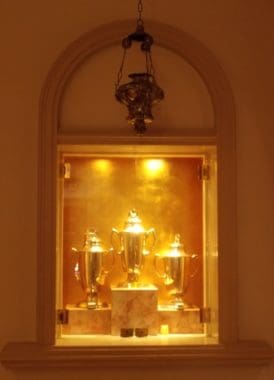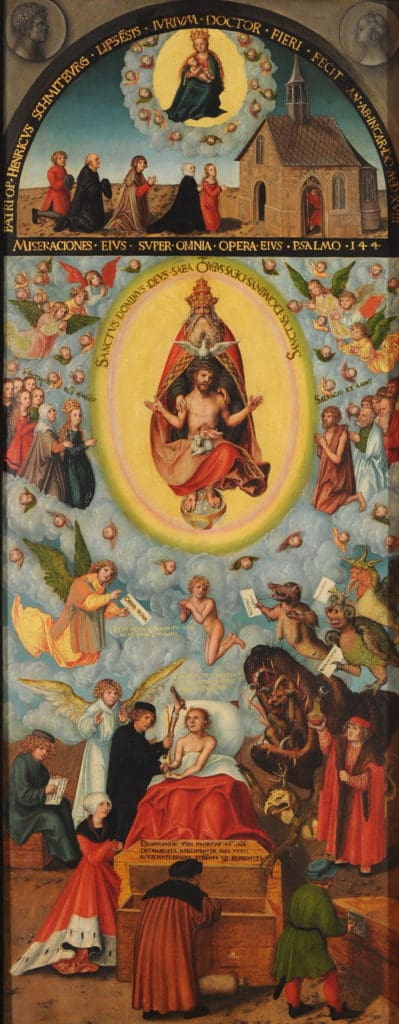O DULCIS VIRGO MARIA!
Oh sweet Virgin Mary!
How Sweet is the Name of Mary in Life and in Death*
Optional Memorial of the Holy Name of Mary
THE great name of Mary…given to the divine mother, was not found on earth, neither was it invented by  the mind or will of men, as were all other names in use among them; but, it came from heaven and was given to the Virgin by divine ordinance, as St. Jerome and others attest. “From the treasury of the divinity, oh Mary, came forth thy excellent and admirable name. For the Most Holy Trinity … gave to thee this name, next to the name of thy Son, so superior to every name, and attached to it such majesty and power, that when it is uttered, all in heaven, earth, and hell must fall prostrate and venerate it” [Richard of St. Laurence]. Among all the other privileges which the Lord has attached to the name of Mary, let us see how sweet he has made it to the servants of this most holy Lady in life, as well as in death.
the mind or will of men, as were all other names in use among them; but, it came from heaven and was given to the Virgin by divine ordinance, as St. Jerome and others attest. “From the treasury of the divinity, oh Mary, came forth thy excellent and admirable name. For the Most Holy Trinity … gave to thee this name, next to the name of thy Son, so superior to every name, and attached to it such majesty and power, that when it is uttered, all in heaven, earth, and hell must fall prostrate and venerate it” [Richard of St. Laurence]. Among all the other privileges which the Lord has attached to the name of Mary, let us see how sweet he has made it to the servants of this most holy Lady in life, as well as in death.
Mary’s Sweet Name, Full of Grace and Blessings
St. Anthony of Padua attributes to the name of Mary the same sweetness as St. Bernard attributed to the name of Jesus. The name of Jesus, said the latter, the name of Mary, said the former, is joy to the heart, honey to the mouth, melody to the ear of their devoted servants. It is related in the life of the [Blessed] John Ancina, Bishop of Saluzzo, that when he pronounced the name of Mary, he experienced so great a  sensible sweetness that he even tasted it on his lips. And, we read in the holy Canticles, at the Assumption of the Virgin, the angels three times asked her name:
sensible sweetness that he even tasted it on his lips. And, we read in the holy Canticles, at the Assumption of the Virgin, the angels three times asked her name:
“Who is she that goeth up by the desert as a pillar of smoke?” [cf Song of Songs 3:6].“Who is she that cometh forth as the morning rising?” [cf Song of Songs 6:10]. And in another:
“Who is this that cometh up from the desert, flowing with delights?” [cf Song of Songs 8:5]
Why did the angels ask the name of this queen so often? “The sound of the name of Mary was so sweet to the angels, and they repeated the question that they might hear it repeated also” [Richard of St. Lawrence].
I do not hear speak of this sensible sweetness, since it is not commonly granted to all, but I speak of the salutary sweetness of consolation, love, joy, confidence, and strength, which the name of Mary universally gives to those who, with devotion, pronounce it….Speaking on this subject, Francone the Abbot says, that next to the holy name of Jesus, the name of Mary is so rich in blessings, that no other name is uttered on earth or in heaven from which devout souls receive so much grace, hope, and sweetness. “For the name of Mary contains in itself something admirable, sweet, and Divine, which, when it meets a friendly heart, breathes into it an odor of holy sweetness. And the wonder of this great name is that if heard a thousand times by the lovers of Mary, it is always heard as new, the sweetness they experience in hearing it spoken being always the same.”
In pronouncing the name of Mary, Blessed Henry Suso felt his confidence so much increased, and his love so joyfully enkindled, that amidst the joy and tears with which he pronounced the beloved name, he  thought his heart would have leaped from his mouth and affirmed that this most sweet name, as honeycomb, melted into the depth of his soul [and he exclaimed]: “Oh most sweet name! Oh, Mary, what must thou thyself be, if thy name alone is lovely and sweet?”
thought his heart would have leaped from his mouth and affirmed that this most sweet name, as honeycomb, melted into the depth of his soul [and he exclaimed]: “Oh most sweet name! Oh, Mary, what must thou thyself be, if thy name alone is lovely and sweet?”
St. Bernard, too, says to her: “Oh great, oh merciful Mary, most holy Virgin, worthy of all praise, thy name is so sweet and lovely that it cannot be spoken without enkindling love to thee and to God in the heart of him who pronounced it; the thought of it alone is enough to console thy lovers, and inflame them with a far greater love to thee.” “If riches are a consolation to the poor, because by them they are relieved of their miseries, oh how much more does thy name console us sinners, oh Mary; far more than the riches of earth it relieves us in the troubles of the present life” [Richard of St. Lawrence].
“Thy name, oh Mother of God, is full of grace and divine blessings” [St. Methodius]. And, St. Bonaventure affirms that the name cannot be pronounced but it brings some grace to him who devoutly utters it. So great is the virtue of thy name, oh most compassionate Virgin, that no one can pronounce it, however hardened, however desponding may be his heart, and not find it wonderfully softened; for thou who consoles sinners with the hope of pardon and of grace.
Mary’s Name is Like Ointment or Oil:
 Thy most sweet name is a sweet ointment, which breathes the fragrance of divine grace. “May this oil of salvation descend into the depths of our soul” by which St. Ambrose intends to say: Oh Lady, remind us often to pronounce thy name with love and confidence; for thus to name thee, either is a sign that we already possess divine grace, or that we shall soon recover it. And, as Landolph [or Ludolph] of Saxony expresses it: “The remembrance of thy name, oh Mary, consoles the afflicted, brings back the wanderer to the path of salvation, encourages the sinner, and saves him from despair.”
Thy most sweet name is a sweet ointment, which breathes the fragrance of divine grace. “May this oil of salvation descend into the depths of our soul” by which St. Ambrose intends to say: Oh Lady, remind us often to pronounce thy name with love and confidence; for thus to name thee, either is a sign that we already possess divine grace, or that we shall soon recover it. And, as Landolph [or Ludolph] of Saxony expresses it: “The remembrance of thy name, oh Mary, consoles the afflicted, brings back the wanderer to the path of salvation, encourages the sinner, and saves him from despair.”
“Thy name is as oil poured out” [cf Song of Songs 1:3]. “The glory of her name is compared to oil poured out. As oil heals the sick, diffuses odor, and kindles flame; thus the name of Mary heals sinners, rejoices hearts, and inflames them with divine Love” [Blessed Alanus]. Richard of St. Laurence encourages sinners to invoke this great name because that alone will be sufficient to cure all their maladies, adding that there is no disease so malignant that it will not at once yield to the virtue of this name.
Devils Fear It
 On the other hand, the devils, as Thomas à Kempis affirms, are in such fear of the Queen of Heaven that at the sound of her great name they flee from him who pronounces it as from burning fire. The virgin herself revealed to St. Bridget that there is no sinner living so cold in divine love, that if he invokes her holy name, with the resolution to amend, the devil will not instantly depart from him. All demons so greatly venerate and fear her name, that when they hear it pronounced they immediately release the soul which they held in their chains.
On the other hand, the devils, as Thomas à Kempis affirms, are in such fear of the Queen of Heaven that at the sound of her great name they flee from him who pronounces it as from burning fire. The virgin herself revealed to St. Bridget that there is no sinner living so cold in divine love, that if he invokes her holy name, with the resolution to amend, the devil will not instantly depart from him. All demons so greatly venerate and fear her name, that when they hear it pronounced they immediately release the soul which they held in their chains.
Angels Draw Closer
Just as the rebel angels depart from sinners who invoke the name of Mary, on the contrary, the good angels draw closer around those just souls who devoutly pronounce it. The frequent utterance of the name of Mary is a sign that we’re already living in divine grace, or that we shall soon receive that life; for this powerful name is effectual to obtain help and life for him who devoutly invokes it [St. Germanus].
A Tower of Strength
This admirable name is like a tower of strength, by taking shelter in which the sinner will be saved from death, since from this celestial tower the most abandoned sinners come forth securely defended and saved [Richard of St. Laurence]. Richard goes on to say it’s a tower of strength which not only shields sinners from punishment but also defends the just from the assaults of hell. Next to the name of Jesus there is no name which gives such support, and through which so great salvation is bestowed upon men, as this great name of Mary. Especially is it everywhere known, and the servants of Mary daily experience, that her great name gives strength to overcome temptations against chastity. Remarking on St. Luke’s words: “And the name of the Virgin was Mary” [cf Luke 1:27], he says that these two names, Mary and Virgin, are united by the evangelist to show the name of this most pure Virgin can never be separated from chastity. Hence St. Peter Chrysologus says the name Mary is a sign of chastity; whoever is in doubt whether he has yielded to temptations against purity, if he remembers having invoked the name of Mary may be sure that he has not violated chastity.

Special Graces for Those Who Recite the Name of Mary
Let us, then, always follow the beautiful counsel of St. Bernard, who says: “In every danger of losing divine grace let us think of Mary, let us invoke the name of Mary together with that of Jesus, for these names are always united. Let these two most sweet and powerful names never depart from our heart and our lips, for they will always give us strength to keep us from falling, and to conquer every temptation.” Very precious are the graces which Jesus Christ has promised to those…devoted to the name of Mary, as he himself, speaking to his holy mother, gave St. Bridget to understand, revealing to her that whoever will invoke the name of Mary with confidence and a purpose of amendment, shall receive three special graces, namely:
- A perfect contrition for his sins,
- The grace to make satisfaction for them and strength to obtain perfection, and, lastly,
- The glory of paradise.
For, as the divine Saviour added: “Thy words are so sweet and dear to me, oh my mother, that I cannot refuse thee what thou doest ask.”
Finally, St. Ephrem adds that the name of Mary is the key of the gate of heaven to him who devoutly invokes it. Therefore, St. Bonaventure rightly calls Mary “the salvation of all those who invoke her as if it were the same thing to invoke the name of Mary and to obtain eternal salvation.” The invocation of this holy and sweet name leads to the acquisition of superabundant grace in this life, and sublime glory in another. “If you desire, then, brethren,” concludes à Kempis, “to be consoled in every affliction, have recourse to Mary, invoke Mary, honor Mary, recommend yourselves to Mary. Rejoice with Mary, weep with Mary, pray with Mary, walk with Mary, and with Mary seek Jesus; in a word, with Jesus and Mary desire to live and die. Do this and you will always advance in the way of the Lord; for Mary will pray for you, and the Son will surely graciously listen to the mother.”
Hope of the Dying
 Very sweet, then, in life to her servants, is the most holy name of Mary, on account of the great graces which it obtains for them, as we have seen above; but sweeter still will it be to them in dying by the sweet and holy death she will obtain for them. [Servant of God] Father Sertorio Caputo, SJ, exhorted all called to the bedside of the dying, to often pronounce the name of Mary, saying that this name of life and hope, pronounced in death, is alone sufficient to scatter the enemies and to comfort the dying in all their anguishes. St. Camillus of Lellis also strongly recommended it to his religious, that they should remind the dying often to invoke the name of Mary and of Jesus, as he always practiced it with others. But, more sweetly he practiced it himself at the moment of his death, when … he named with so much tenderness his beloved names of Jesus and Mary, that he inflamed also with love of them all those who heard him. And at length, with his eyes fixed on their adorable image … the saint expired in celestial peace, pronouncing with his last breath the most sweet names of Jesus and Mary. This short prayer of invoking the holy names of Jesus and Mary, says à Kempis, which is as easy to retain in the memory as it is sweet to consider, is at the same time powerful to protect whoever uses it from all the enemies of our salvation.
Very sweet, then, in life to her servants, is the most holy name of Mary, on account of the great graces which it obtains for them, as we have seen above; but sweeter still will it be to them in dying by the sweet and holy death she will obtain for them. [Servant of God] Father Sertorio Caputo, SJ, exhorted all called to the bedside of the dying, to often pronounce the name of Mary, saying that this name of life and hope, pronounced in death, is alone sufficient to scatter the enemies and to comfort the dying in all their anguishes. St. Camillus of Lellis also strongly recommended it to his religious, that they should remind the dying often to invoke the name of Mary and of Jesus, as he always practiced it with others. But, more sweetly he practiced it himself at the moment of his death, when … he named with so much tenderness his beloved names of Jesus and Mary, that he inflamed also with love of them all those who heard him. And at length, with his eyes fixed on their adorable image … the saint expired in celestial peace, pronouncing with his last breath the most sweet names of Jesus and Mary. This short prayer of invoking the holy names of Jesus and Mary, says à Kempis, which is as easy to retain in the memory as it is sweet to consider, is at the same time powerful to protect whoever uses it from all the enemies of our salvation.
“Blessed is he,” says St. Bonaventure, “who loves thy sweet name, oh Mother of God. Thy name is so glorious and admirable, that those who remember to invoke it at the moment of death, do not then fear all the assaults of the enemy.”
Father Fulgentius of Ascoli, OF Cap expired singing: “Oh Mary, Mary the most lovely of all beings, let me depart in thy company.” [And] Blessed Henry the Cistercian … died with the name of Mary on his lips! Let us pray [that] God to grant us this grace, that the last word we pronounce at death may be the name of Mary, as St. Germanus desired and prayed, “Oh sweet death, oh safe death, that is accompanied and protected by such a name of salvation, that God does not permit it to be invoked in death, except by those whom he will save!”
Oh, my sweet Lady and mother, I love thee much, and because I love thee, I love also thy holy name. I purpose and hope with thy aid always to invoke it in life and death [St. Liguori].
For the glory, then, of thy name, when my soul departs from this world, wilt thou come to meet it, oh blessed Lady, and take it in thy arms? Do not disdain, oh Mary, to come and comfort it, then, with thy sweet presence. Thou art its ladder and way to paradise. Wilt thou obtain for me the grace of pardon and eternal rest? Oh Mary, our advocate, to thee it belongs to shield thy servants, and defend their cause before the tribunal of Jesus Christ [St. Bonaventure].
+
* Adapted from St. Alphonsus Liguori’s treatise on the most holy name of Mary, found in his work “The Glories of Mary”.
+
Art: Vierge aux roses (Virgin with roses), Giovanni, 17th century, PD-US author’s life plus 70 years or less; Himmelfahrt Mariens, Mariano Salvador Maella, by 1819, PD-US author’s life plus 100 years or less; A leaf from the “Prayer Book of Sigismund I of Poland”, Stanislaw Samostrzelnik, 1524, PD-US author’s life plus 100 years or less; Detail from The ambry in the Cathedral of Saint Mary in Miami, Florida, Farragutful photographer, 25 January 2015, own work, CCA-SA 4.0 International; The Immaculate Conception, Giambattista Tiepolo, 1767-68, PD-US author’s life plus 100 years or less; Mariae Benedictum in Saecula (May the Name of the Virgin Mary be Blessed through the Ages) colorized detail of Pseudo-Gothic Triptych, Francisco Pallàs y Puig, between 1890 and 1899, PD-US author’s term of life plus 80 years or less; Der Sterbende (The Dying Man), Lucas Cranach the Elder, PD-US published in the U.S. prior to 1 January 1923; all Wikimedia Commons.




